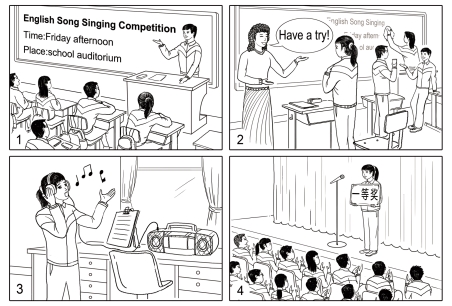题目内容
“Do you like doing things for people?” I asked a friend.
“Yes, most of the time,” she replied.
“Most of the time?”
“Well, I love to do things that are unexpected. I like to do little things most people wouldn't think about doing,” she said.
“But why did you say most of the time?”
“Well, sometimes after doing those little things people take advantage of you. I mean, they expect you to do it again. They ask you to do it. That’s when I don’t like it.”
It was odd that I had this conversation. This just happened to me. I love to do little things. I will pay for a meal card for the people in the office every time we have a meeting there. Not a big thing. It’s a little thing. $5.30 will pay for almost five lunches. Hey, big spender!
I also bought a bag of animal crackers for a friend at work. She was having a tough day and not very happy at all. I drove down to the Wal-Mart and picked up a huge bag for under $2.00. Her smile was worth it.
But one week she said, “Bob, we ran out of crackers. We love them so much.” I didn't want to do it. I smiled and she persisted. I finally admitted, “It’s different when I do it because I want to, but now you are trying to make me go to get them. It’s not the same.” But I bought it for her.
Unfortunately, a big fire in my family took away all the possessions we had. I didn’t know what to do and how to do it. What happened to me then surprised me most. I once had my bike repaired, but the repairman said “no charge” on hearing my sufferings. A stranger called James Kennedy read some pieces I’d written about our sufferings for Slate, the online magazine, and wanted to give us a new house across the lake from New Orleans. I refused but I felt moved. Another poet at the University of Florida also wanted to let his house to me free of charge while he was on holiday. My mates gave us more money for us to rebuild my home. When you do something kind for others, do you always get rewarded? Yes, but not in the way you might expect.
1.What’s the main purpose of the first paragraph?
A. To tell the background of the story.
B. To attract the attention of the readers.
C. To get the readers to know main idea directly.
D. To explain the reasons why he wrote the passage.
2.What do we know about James Kennedy?
A. He was a writer of an online magazine.
B. He was also a poet at the University of Florida.
C. He offered the author a new house free of charge.
D. He learned about the author’s sufferings online.
3.What can we learn from the passage?
A. Misfortune of blessing on happiness.
B. Never too late to learn.
C. Helping others means helping yourself.
D. Many hands make the work lighter.
1.C
2.D
3.C
【解析】
试题分析:帮助别人应该期望回报吗?作者认为应该主动去帮助别人做力所能及的事情,但是不应该成为被人利用的对象。回报也许会是意料之外的。
1.C主旨大意题。纵观全文,围绕是否应该主动帮助别人展开,作者还提到自己的亲身经历,并有了自己的感悟。可以判断第一句就是文章的主旨。故选C。
2.D推理判断题。根据最后一段中A stranger called James Kennedy read some pieces I’d written about our sufferings for Slate, the online magazine...可判断出是通过网络杂志知道作者的事情。故选D。
3. 主旨大意题。作者用自己的亲身经历阐述了文章的主旨。帮助别人不求回报但回报会用一种意外的方式出现。故选C。
考点:考查说理议论类短文阅读

 天天向上一本好卷系列答案
天天向上一本好卷系列答案 小学生10分钟应用题系列答案
小学生10分钟应用题系列答案